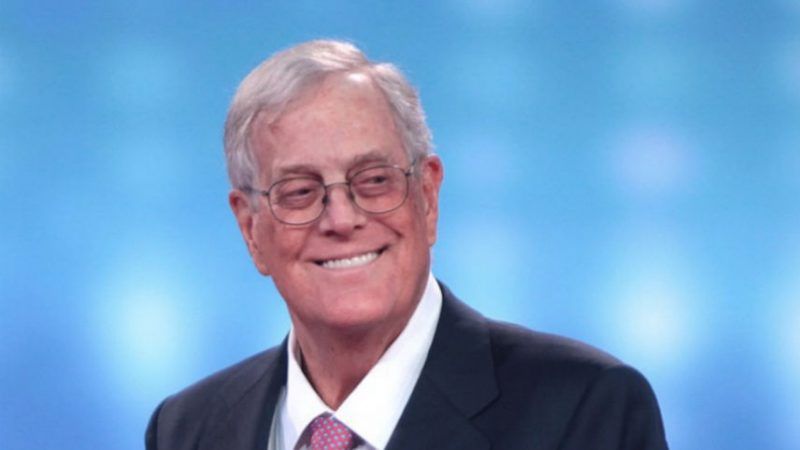David Koch, R.I.P.
The free market philanthropist is dead at 79.

David Koch, who along with his brother Charles ran one of America's most prominent political giving machines, has died at age 79.
Koch was one of four children of the oil industrialist Fred Koch, and along with his older brother Charles he became one of America's richest men through the growth of the family business. Due to the brothers' funding of political causes and candidates, the Kochs became betes noir of the American left. (Koch was for 36 years a trustee of the Reason Foundation, which publishes Reason magazine.) Often incorrectly described as a conservative or a Republican, David Koch was a lifelong libertarian whose work and giving reflected the values of free enterprise and limited government.
Born in Wichita in 1940, Koch earned undergraduate and graduate degrees in chemical engineering from MIT, where he also excelled in basketball. After working for outside companies from 1963 to 1970, including a stint at the management consulting firm Arthur D. Little, Koch began working in the family business in 1970 as a technical service manager at the subsidiary Koch Engineering for a salary of $16,000. He rose to be president of the division, and he went on to serve in various capacities in the set of privately owned family businesses, including president of Koch Engineering and Executive Vice President of Koch Industries. He retired officially last year because of his fading health.
In a 2005 interview for my book Radicals for Capitalism, Koch told me his father taught him that "big government was bad, and impositions of government controls on our lives and our economic fortunes was not good." In the mid-1960s, with encouragement from Charles, he attended the Freedom School, an early libertarian educational institution run by Robert LeFevre, whose variety of libertarianism rejected both political activism and violence, even in self-defense. While LeFevre was one of their earliest exposures to the organized libertarian movement, both brothers denied that they ever embraced his entire package of ideas. As they began financing, working with, and guiding libertarian institutions in the 1970s, their activism involved support and promotion for the pro-market Austrian school of economics exemplified by Ludwig von Mises and F.A. Hayek. Libertarian educational institutions, think tanks, legal action groups, grassroots activism, magazines, criminal justice reform efforts, and student groups all received largess and guidance from the Koch brothers from the 1970s through the present.
In the 1980 presidential campaign, when recently imposed campaign finance restrictions hobbled third parties' abilities to fundraise by severely limiting how much any single donor could give, David Koch took advantage of the fact that the rules allowed candidates themselves to self-finance as they wished: He became the Libertarian Party's vice presidential nominee. He and running mate Ed Clark got more than 1 percent of the vote, a party record that would go unbroken until 2016.
Koch told New York magazine during that campaign that he'd been excited by the previous Libertarian presidential run by Roger MacBride, saying the party was "advocating all the things I believed in. [MacBride] wanted less government and taxes and was talking about repealing all these victimless-crime laws that had accumulated on the books. I have friends who smoke pot. I know many homosexuals. It's ridiculous to treat them as criminals—and here was someone running for president, saying just that."
After winning the vice presidential nomination, Koch told the assembled Libertarian delegates that the party's members "represent the best hope for human freedom since the American revolution" and that "as a businessman, who's run a successful company, who's had to deal with the harassment and ridiculous interference of government in the affairs of my business….I can be particularly effective at communicating the libertarian ideas and concepts to the businessman." Koch listed the run as his "proudest achievement" in a 1987 MIT alumni newsletter.
In 1984 Koch co-founded Citizens for a Sound Economy, a free market advocacy and research organization that later split into FreedomWorks and Americans for Prosperity, both prominent players in 21st century Republican and libertarian circles in the pre-Trump age (though Koch was only directly involved with the latter). Koch continued to donate and to often serve on the boards of market-oriented advocacy groups, and the political operation funded and managed by him and Charles became notorious in the Obama age as the supposedly sinister face of money in politics.
As was his way, Koch mostly declined to participate in public controversies over his political beliefs or funding. But as he told me in that 2005 interview, he had come to see political philanthropy as finding "aggressive salesmen" who understand that you can have the best product in the world but if you aren't finding consumers to buy it, you need to do whatever it takes to sell it, including spending "staggering sums on advertising and promotion" in the mold of Procter & Gamble. You have to find talented people with good ideas, and try different approaches, to help generate political and philosophical change.
Koch was an inveterate experimenter in that process, to the great benefit of many libertarian institutions—he told me he'd been on as many as 20 boards at a time.
The vast bulk of Koch's philanthropy was not political. It included hundreds of millions of dollars for cancer research (he was diagnosed with prostate cancer in 1992) and major arts and sciences institutions, museums, schools, and public television, with much of his institutional philanthropy centered in New York City, his home for decades.
He is survived by his wife Julia and their three children.


Show Comments (154)